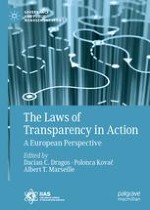2019 | OriginalPaper | Chapter
4. Access to Information in Belgium
Authors : Stef Keunen, Steven Van Garsse
Published in: The Laws of Transparency in Action
Publisher: Springer International Publishing
Activate our intelligent search to find suitable subject content or patents.
Select sections of text to find matching patents with Artificial Intelligence. powered by
Select sections of text to find additional relevant content using AI-assisted search. powered by
